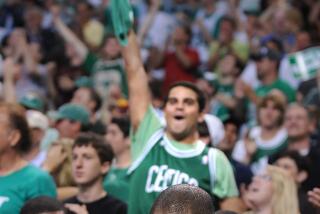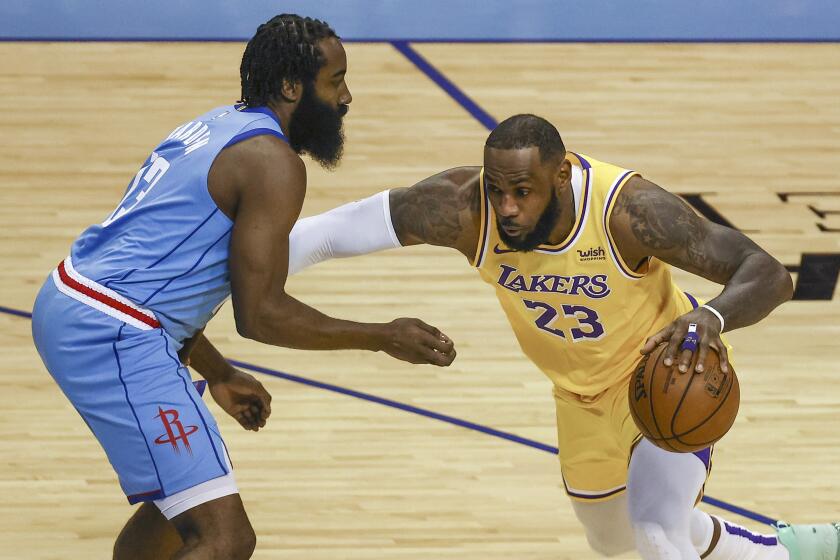No Super Model?
- Share via
AUBURN HILLS, Mich. — Who needs superstars?
The Lakers do. The NBA does -- and not necessarily white ones, Larry Bird.
But the Detroit Pistons are managing just fine without anyone who could get a free meal west of Ann Arbor.
They’re going against the concept of what it takes to win in this league that developed over the past quarter-century and beyond.
Since 1980, every NBA champion has had at least one future Hall of Fame player on the roster. Most had at least two. And since the NBA first named a Finals MVP in 1969, all but four times the award has gone to a player who currently resides in the Hall of Fame or is clearly on his way.
So here are the Lakers, whose solution to the abrupt halt of their superstar-driven reign of Shaquille O’Neal and Kobe Bryant was to add two more Hall of Fame-caliber players in Karl Malone and Gary Payton. And there are the Pistons, with considerably fewer accolades, a roster full of players who have been traded or dumped at some point in their careers because teams thought they could get someone better.
Their most accomplished player is Ben Wallace, who played in Washington and Orlando before flourishing in Detroit, a starter on the Eastern Conference All-Stars and a member of the all-NBA second team, a former defensive player of the year. Still, he wouldn’t be considered a scoring threat if he were on the court by himself.
Yet it’s the Pistons who are halfway toward winning this series, who have dictated the play for the majority of the three games, who are looking like champions.
“If you want to go down the roster and look at, as far as the talent level goes, I think by far the Lakers have got the most talent,” Wallace said. “But as far as going out and playing together as one unit, I think we’re the better team in that respect because we don’t depend on one guy to carry us night in and night out. Anybody can step up on this team and shoulder the load. That’s how we play basketball.”
Piston Coach Larry Brown has tried the superstar approach. He made it to the NBA Finals on the scrawny legs of Allen Iverson three years ago, with a Philadelphia 76er team designed to let the super-quick point guard take the shots while everyone else did the dirty work. Iverson was the most valuable player in the league that season, but he couldn’t take down the Lakers single-handedly.
“He took a lot of shots and there are a lot of things that maybe a basketball purist would look at and say, ‘Well, that’s not the right way to play,’ ” Brown said. “But for our team, that was the only way we had a chance to win.
“And it was funny, because there wasn’t a time we didn’t have a timeout that somebody on the team wasn’t mumbling about what Allen had done. But really, when the clock was running down, they threw him the ball and ran away.”
Superstars get the big money because they’re the ones who want to take that shot. They’re not afraid to miss it, although they rarely do. And if they can’t score, they’re more likely to draw a whistle from the officials.
Bryant made the three-point shot that rescued the Lakers with 2.1 seconds remaining in regulation of Game 2. Bryant’s prowess also played a hand in Derek Fisher’s shot in Game 5 of the San Antonio series. Because the Spurs were so worried about Bryant’s beating them, they double-teamed him and didn’t have a defender on the inbounder, which allowed Payton to make a clean pass to Fisher.
Those are the intangible qualities a superstar brings.
Laker Coach Phil Jackson called it a “perception of invincibility,” and it can be just as challenging for the superstars’ own coach as it is for the opponents.
“When you’re a coach, you have to allow them to understand that that perception is part of their persona, and they are still a player that has to do the things that are correct in basketball to win at this level,” Jackson said. “Because if you don’t, the little things slip, the things that make a player great, doing all of the tasks, boxing out, moving the basketball, playing inside a team offense, playing defense the correct way, moving the ball if you’re double-teamed. All of those things still have to be performed if you’re going to be a superstar.”
Jackson, who won championships with O’Neal and Bryant in Los Angeles and Michael Jordan in Chicago, was asked which of the superstars he has coached best understood the “fine line” they have to walk.
“I would hate to name names,” Jackson said. “I can give initials, though.”
That would be M.J.
Those who think Jackson simply showed up at the right place to win his nine championships don’t understand exactly how difficult it is to get talented players to conform to a common goal. Payton struggled with his new complementary role and appeared to lose interest as the playoffs progressed. Bryant and O’Neal continued to have different interpretations of the Lakers’ best path to victory.
On Friday, Bryant, asked about O’Neal’s continued demands to get the ball, said, “We’re not worried about getting him more touches, we’re worried about winning the game and getting everybody better looks.”
Said O’Neal: “You’ve got to try to keep everybody involved. But I’ve always said that if a team is going to play me single coverage you’ve got to make them pay. And we haven’t made this team pay yet. We are relying on jumpers and we are relying on other stuff.”
That’s his code for “Kobe’s trying to do too much by himself.”
Earlier, Detroit guard Richard Hamilton was on the same podium, showering his teammates with love.
“I think we’re definitely a team that really plays together,” Hamilton said. “We love each other on and off the court. I think that carries on the floor and the way we play. I think we all care for each other. We’ve all got each other’s back.”
That’s not to say that Brown never has problems with his players. Point guard Chauncey Billups is his latest sore spot (“He’s tougher on me than anybody,” Billups said), but watching these Pistons it’s clear that they all buy into Brown’s approach and have the same approach to winning.
“With this team, I don’t think we have any one guy that they look at that can bail us out, so it’s imperative that they play as a team on both ends of the court,” Brown said. “And we can’t waste a possession or expect somebody to bail us out offensively; we’ve got to do it defensively. We’ve got to make a stop or get a steal, block a shot.”
Credit Piston President Joe Dumars for his different tack to building a champion.
“I think teams win championships,” Dumars said. “I really do. There are a lot of superstar-type players right now who are on teams that didn’t even make the playoffs, who were out in the first round, you know what I’m saying? Because they didn’t have the team around them. I don’t think it’s just enough to go out and say, hey, get a superstar and you’ve got a chance to win a world championship. You’d better build a team. I was very interested in building a team and adding the pieces that we needed at the time, than just to go out and get a superstar, then figure out how to put a team together after that.”
It’s up to the league to figure out how to market them. Ratings for the first three games of the series averaged a 10.4, which is 68% higher than last year’s bore-a-thon between the San Antonio Spurs and New Jersey Nets.
People aren’t watching the Pistons, they’re watching the Lakers. Or they’re watching to see the Pistons beat the Lakers. Take the Lakers out of the equation and ABC would be better off showing reruns of “Dynasty.”
The NBA still needs its stars, still needs its known entities to root for or against.
And at this point they don’t need to be white. Sure it would help, but the lack of an American-born white superstar didn’t keep 21.8 million people from coming out to the arenas this season, a record for the league.
Bird got into trouble this week when he said the league could use more white stars. To some degree, he’s right. You can’t tell me the affection the Staples Center crowd showed for Luke Walton from the first exhibition game didn’t come in part because he’s the only white American on the Lakers.
That doesn’t make the fans racist. Rooting for your own doesn’t mean you’re against anyone else. It’s like pulling for the woman from your home state in the Miss America pageant. Or African Americans suddenly watching Wimbledon to see the Williams sisters.
The NBA would not have reached the heights it achieved during the 1980s and 1990s without the racial dynamic of Bird vs. Magic Johnson. Johnson, for all of his charisma and dazzling game, couldn’t have lifted the NBA on his own without Bird.
Today, while America is far from a color-blind society, we’ve moved past race as an impediment to popularity. Look at how hip-hop dominates radio and MTV. And look at how many white kids still wear the jersey of Bryant, a black man accused of rape.
Our country has changed. And so have the requirements for winning an NBA championship. Leave the Hall of Fame credentials outside, grab the time card and punch in.
*
J.A. Adande can be reached at [email protected]. To read previous columns by Adande, go to latimes.com/adande.
More to Read
All things Lakers, all the time.
Get all the Lakers news you need in Dan Woike's weekly newsletter.
You may occasionally receive promotional content from the Los Angeles Times.






